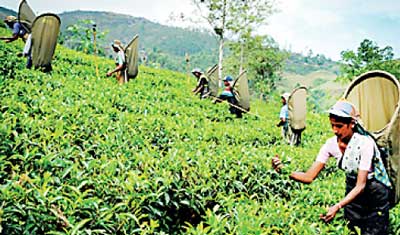Thursday Feb 19, 2026
Thursday Feb 19, 2026
Friday, 24 June 2016 00:30 - - {{hitsCtrl.values.hits}}
The Regional Plantation Companies (RPCs) have put forward a modified proposal on the wages of estate/plantation sector workers, which via a hybrid solution attempts to bridge the gap between the demands of the unions and the need for productivity improvement emphasised by the RPCs since the inception of the current round of wage negotiations.
Accordingly, the modified proposal suggests the remuneration of the workers based on the existing attendance-based wage for 12 days of the month and the other working days for the workers to be remunerated based on the ‘productivity based revenue sharing’ model; that is based on the actual amount of kilos of tea leaves plucked. 
This productivity based model is practiced widely in most of the sustainable and progressive Tea economies and has been found to be a success in enhancing worker engagement – resulting in increased earnings for those involved.
For 12 days of the month on which the attendance-based wage is applicable with all the current practices, despite severe financial constraints, considering the expectations of the workers, the Regional Plantations Companies propose the increase of the daily package by Rs. 100 to Rs. 720. On the other working days (on which the productivity based revenue sharing method is applicable), a predetermined per kilo rate has been proposed by the RPCs. This rate is significantly greater than the current per kilo rate paid to the pluckers in the Tea Smallholder sector who are responsible for more than 75% of the national green leaf production.
The Regional Plantation Companies are confident that by incentivizing greater productivity through worker engagement – in which Sri Lanka is significantly lagging behind all other major tea producing nations – the new proposal enables workers to earn a substantially higher income than what they receive at present. The Regional Plantation Companies are of the view that by linking remuneration with output instead of mere attendance, productivity in the estate sector can be improved by as much as 50% and that the incomes of the workers can improve by the same extent.
“While the Regional Plantation Companies would strongly prefer remuneration being linked entirely with output as in most tea and rubber producing nations around the world, we have done our utmost to provide at least a temporary solution acceptable to the unions and the workers,” said Roshan Rajadurai, the Chairman of the Planters’ Association of Ceylon – which represents the Regional Plantation Companies (RPCs). “We expect this to lay the foundation for the adoption of remuneration/earnings based entirely on output in the near future, which we are confident will benefit all industry stakeholders – especially considering the highly successful adoption of revenue sharing at many RPC estates.”
The archaic attendance-based wage system, with the mandatory offer of 300 days of work by the estate for all the workers irrespective of field or worker outputs or any other consideration, is the basis on which workers in tea and rubber plantations managed by RPCs are being remunerated at present. This has contributed substantially to low productivity and high production cost leading to the industry becoming unsustainable.
These long-standing wage and productivity issues exacerbated with the the sharp fall in the prices of both tea and rubber globally – leading to heavy losses in both tea and rubber. The rubber prices have dropped almost by 50% in the last five years while the daily labour wage in the estate sector has increased by 20% during the same period. Similarly in tea, the Cost of Production (COP) and the Sale Average were almost equal in 2005 but thereafter the daily wage has increased dramatically to far outstrip the Sale Average by almost 63%. Therefore by the end of 2015 the RPCs were incurring a loss of approximately Rs. 72 on each kilo of tea and Rs. 82 per kilo of rubber produced.
In this light, to ensure the sustainability of Regional Plantation Companies and the livelihoods of the nearly one million population who depend on and reside within the RPC estates, the RPCs and the Planters’ Association has been continuously calling for output-linked remuneration. Earlier the RPCs presented proposals on productivity based wages in the estate sector or revenue sharing (similar to the smallholder model) but these were rejected by the labour unions.